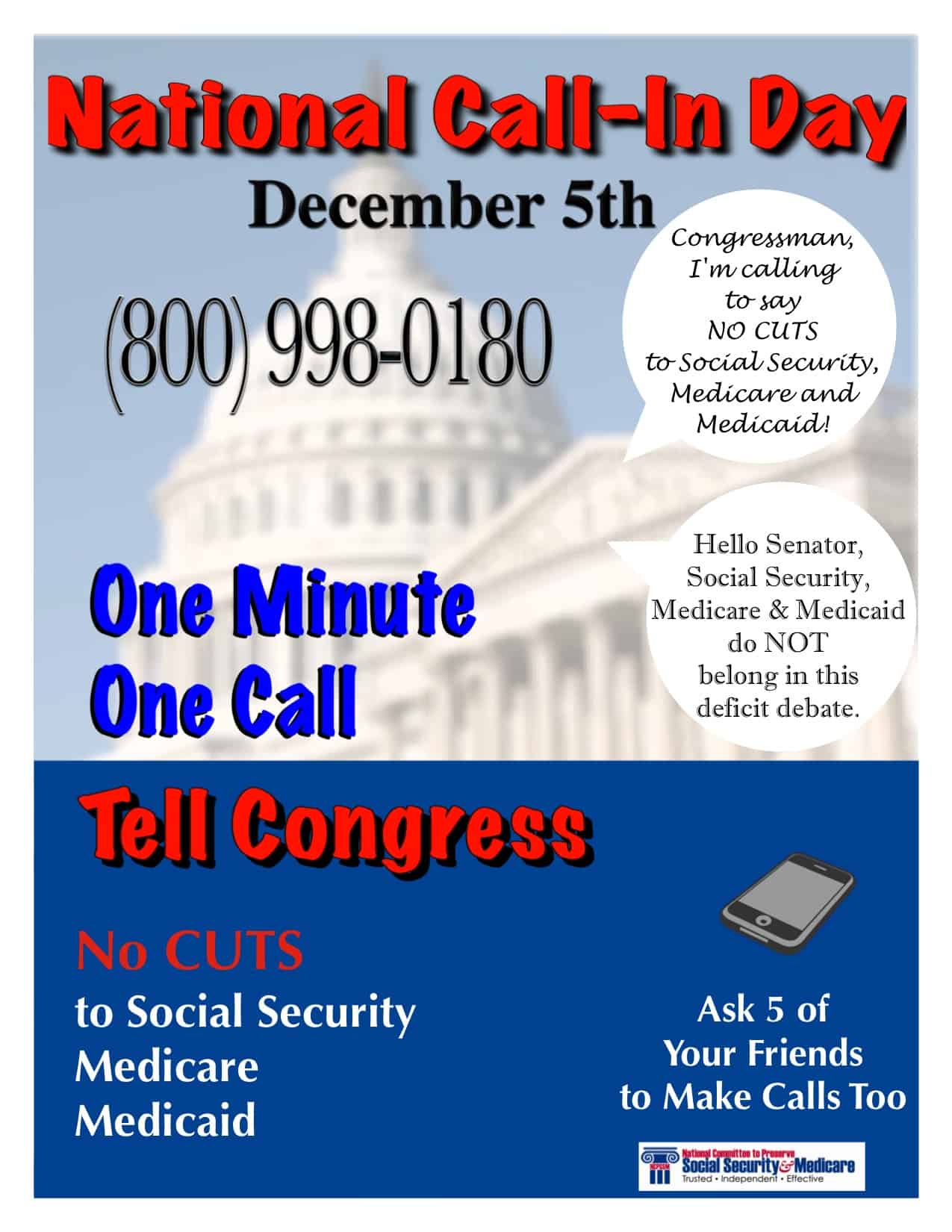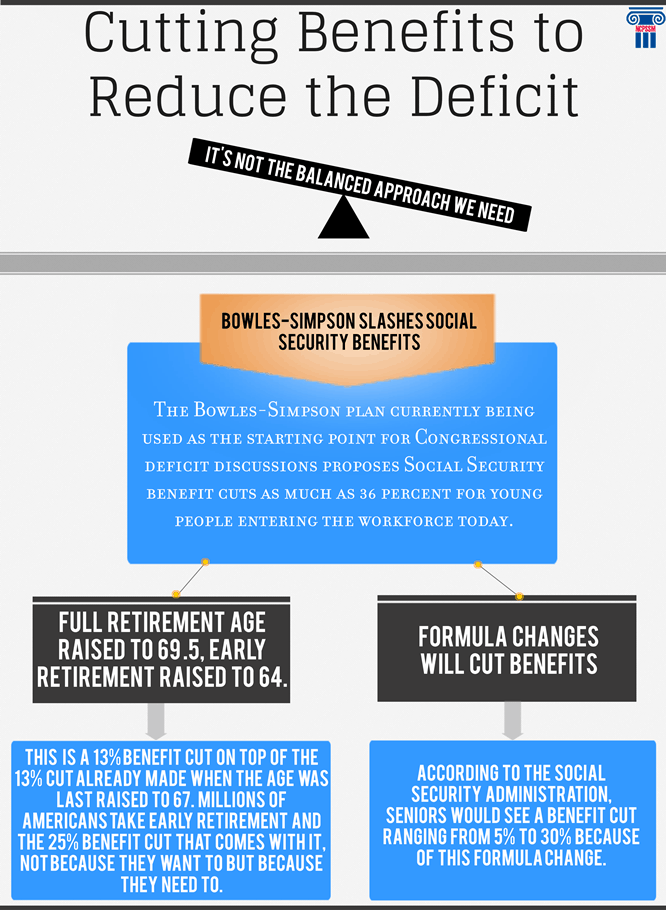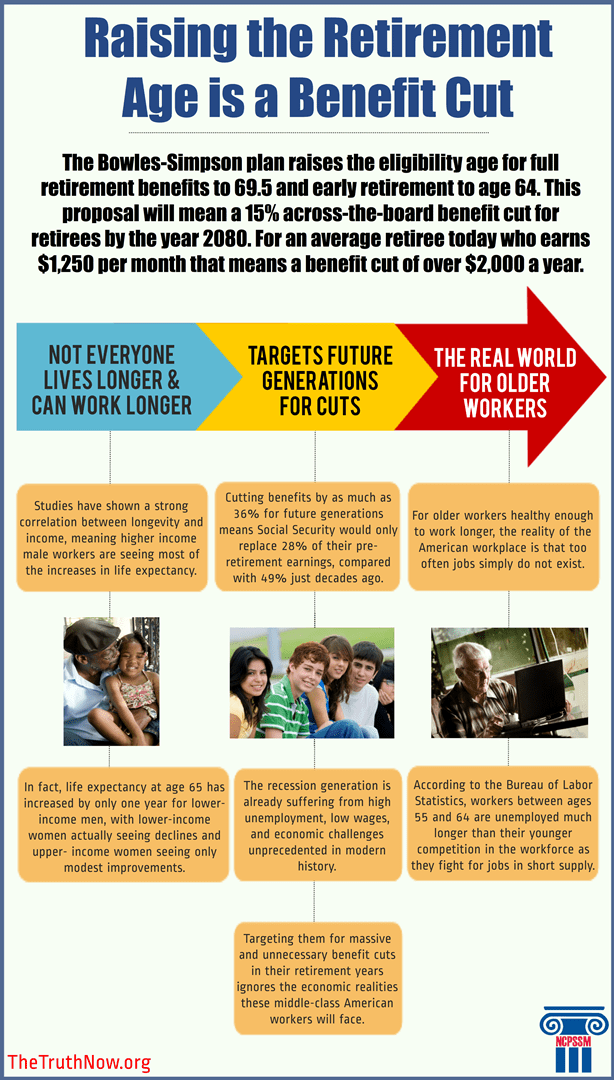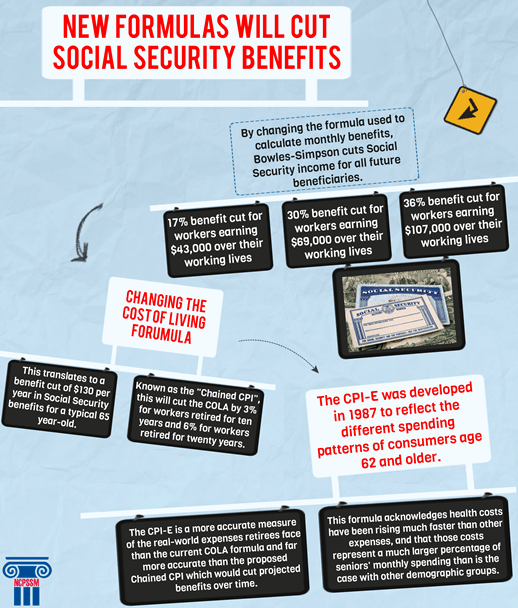National Call In Day – Tell Congress No Cuts to Middle-Class Benefits
One Minute, One Call to Save Social Security, Medicare & Medicaid
The National Committee is joining advocates across the nation in a Congressional Call-In day on Wednesday, December 5th. Our goal is to flood Congress with calls reminding them that Americans of all ages and political parties do not support cutting middle-class benefits to pay for deficit reduction. Let’s shutdown the Capitol switchboard with thousands of calls delivering one simple message!
NO CUTS to Social Security, Medicare and Medicaid
The threat to Social Security, Medicare and Medicaid during this Lame Duck Congress is as serious as any time in these programs’ long and successful histories. Social Security, Medicare and Medicaid do not belong in this deficit debate and we must urge Congress to take these programs off the table.
Making your call couldn’t be easier. Just dial NCPSSM’s Legislative Hotline and you’ll be directed to your Congressional leaders from one toll-free number:
NCPSSM CONGRESSIONAL CALL IN DAY
(800) 998-0180
Send our flyer to 5 of your friends and tell them One Minute, One Call can make the difference in the fight to preserve America’s vital retirement and health security programs.

Breaking Down Plans to Cut Medicare & Social Security
As we’ve reported here many, many times conservatives in Congress continue to demand cuts to Social Security, Medicare and Medicaid to reduce the deficit. There are a myriad of bad ideas that they’ve proposed to do this.
Here are some (hopefully) easy to understand infographics on some of the proposals currently being debated in closed-door Congressional deficit talks. You’ll note that many are based on the Bowles-Simpson (BS) report, which is the bible for corporate CEO’s and the well-funded fiscal hawk lobby. You can also find all of these on the National Committee’s Lame Duck website.
We’re also asking you to sign the online version of our “No Cuts” petition here. We will have more than 65,000 petitions to deliver to the Senate soon…please add your voice to the debate.









Americans Don’t Support Cutting Social Security & Medicare for Deficit Reduction: Even Wall Street-backed “Third Way” Agrees
We’ve said it before and we’ll say it again: Americans do not support cutting Social Security and Medicare to pay down the debt. This was confirmed, again, in a new poll released by Third Way, an organization backed by Wall Street which promotes cutting programs like Social Security and Medicare as the “centrist” option. Yet, they’ve chosen to bury that lead in favor of headlines that better fit its mission. Why? To convince Democratic members of Congress that voters will give them a pass if they cut these vital programs. While the Third Way polling memo headline states that voters want the President and Congress to “fix” Social Security and Medicare, you have to dig deep into their narrative to also find this line:
“voters indicate that they want these programs fixed to keep them solvent, but not pay down the debt.”
No kidding.
Unfortunately, Politico took the Third Way bait and reported that this survey was countering:
“surveys showing that Democrats don’t want lawmakers to touch entitlements, don’t view the debt and deficit as a top priority, and don’t favor Obama working with Republicans.”
The problem is…that’s just spin. It completely ignores what our poll (and several others) actually reported. For Third Way that type of “everyone else got it wrong” marketing is critical to their goal of persuading Democrats that the American people won’t punish them if Congress follows Wall Street’s economic prescription and cuts middle-class benefits in the name of deficit reduction. However, it also ignores that fact that the American people understand the difference between making reforms to improve Social Security and Medicare’s long-term solvency and cutting benefits to reduce the deficit. Using words like “fix” rather than what they really mean, benefit cuts, shows the fix was in on this polling.
We also have to wonder, if the true goal was to prove that every poll ever taken in the past two years is wrong and the American people really do support cutting middle-class benefits, where is the critical polling question that gets to the heart of the Social Security/Medicare/Deficit issue: “Do you support cutting Social Security and Medicare benefits?” If it was asked it must be among the 52 of 81 questions which haven’t been released in this Third Way poll. Any bets as to why?
Let’s be really clear about what our NCPSSM/Lake Research poll showed. It showed Americans, of all ages and political parties, do not support cutting Social Security and Medicare as part of this deficit debate:
- Voters strongly oppose cutting Social Security benefits with 71% opposed to means-testing and 67% opposed to raising the retirement age
- 64% strongly oppose cutting Medicare benefits for future retirees and 59% oppose cutting payments to Medicare providers want voters support two Social Security and Medicare reforms by overwhelming margins:
Our poll also shows Americans support two Medicare and Social Security reforms by wide margins:
-
On Social Security, voters across party lines support lifting the cap on wages above the current level of $110,100. We know from focus groups that voters see this cap as an unfair loophole that they did not even know existed. Sixty-five (65) percent of voters favor gradually lifting this cap for both employees and employers, including 75 percent of Democrats, 63 percent of Independents, and 54 percent of Republicans.
-
On Medicare, overwhelming bi-partisan majorities support allowing Medicare to negotiate with drug companies to bring down the cost of prescription drugs. Eighty-six (86) percent of voters favor this, including 77 percent who strongly favor it. By party, 91 percent of Democrats favor allowing Medicare to negotiate with drug companies (81 percent strongly favor), as do 85 percent of Independents (75 percent strongly favor), and 81 percent of Republicans (75 percent strongly favor).
Lastly, our poll shows that 85% of those surveyed say Social Security and Medicare were important factors in casting their 2012 vote.
Ultimately, that is what makes Washington’s fiscal hawks and Wall Street backed groups like the Third Way nervous. Because even their own polls, no matter how they’re twisted and spun, show the American people do not support cutting Social Security and Medicare as part of this deficit debate.
You Gotta Wonder — Did Washington Hear What Voters Told Them About Social Security & Medicare on Election Day?



NCPSSM President/CEO, Max Richtman, wrote a rebuttal to the USA Today editorial. In it he said:
The billion dollar national campaign to cut Social Security, Medicare and Medicaid to reduce the deficit is an example of the old political saying: “Never let a good crisis go to waste.” America doesn’t face an entitlement crisis. However, cutting benefits for middle-class and poor Americans remains the go-to solution for fiscal conservatives who see the congressionally created “fiscal cliff” as their golden opportunity to target these vital programs.
The true challenges facing our nation include growing our economy, creating jobs and reducing health care costs systemwide (not just in Medicare and Medicaid). This is where the American people want Washington to focus its attention. They made that clear on Election Day.However, many politicians continue to push for cutting Social Security’s earned benefits by raising the retirement age, reducing the cost of living allowance, or changing the benefit formula. That doesn’t create jobs. It doesn’t grow our economy (just the opposite), and it makes it harder for seniors to afford their Medicare coverage. Social Security is prohibited by law from contributing to the deficit and simply does not belong in this debate. Voters of all ages and political stripes understand this and oppose cutting benefits.
The challenges facing Medicare and Medicaid are different. The health care reform law has proved that Medicare can be reformed without hurting beneficiaries. Thanks to health care reform, seniors have saved billions in prescription drug costs and received extra benefits, and Medicare gained eight years of solvency. Ironically, many of Washington’s most vocal fiscal hawks have voted to repeal these reforms, which would have severely worsened our deficit and Medicare’s fiscal health. To control the cost of federal health programs, we must control spending in the entire health care sector.
Congress and the president should listen to the vast majority of Americans who support reforms such as allowing Medicare to negotiate for lower prescription drug costs, which would save billions, and lifting the Social Security payroll tax cap, which would solve most of Social Security’s long-term problem. Not surprisingly these proposals, which impact large corporations and wealthier Americans rather than the middle class, are seldom mentioned by the deficit-crisis crowd.
So much for “shared sacrifice.”
Max Richtman is president and CEO of the National Committee to Preserve Social Security and Medicare.
Today we also released results from new national polling commissioned by NCPSSM with Lake Research Partners which shows the disconnect between middle-class Americans and Washington on how best to put our fiscal house in order has never been larger.
While many in Congress want to cut Social Security, Medicare, and Medicaid to reduce the deficit, strong majorities of voters across party lines disagree with that approach.
- 85% of those polled say Social Security and Medicare were important factors in casting their 2012 vote
- By a 3-1 margin, voters overwhelmingly support preserving the traditional Medicare program rather than giving retirees a voucher, even a plurality of Republican voters preferred this approach
- Voters strongly oppose cutting Social Security benefits with 71% opposed to means-testing and 67% opposed to raising the retirement age
- 64% strongly oppose cutting Medicare benefits for future retirees and 59% oppose cutting payments to Medicare providers
While cutting the deficit ranks far below the economy and jobs as a priority for Americans polled, they do support two reforms impacting Social Security and Medicare:
- 64% support raising the Social Security payroll tax cap so that higher income earners contribute on all of their earnings, just as lower wage workers do. That includes 75% of Democrats, 63% of Independents and 54% of Republicans
- 86% of those polled want Medicare to negotiate lower prescription drug prices, saving the program billions of dollars each year.
The National Committee also delivered letters from more than 100,000 members and supporters nationwide urging their representatives to reject middle-class benefit cuts in the name of deficit reduction are also being delivered to Congress this week.



It’s not too late for you to join our letter campaign. Just go online here and we’ll connect you with your members directly via email. You can also send our petition from the same link.
NCPSSM Talks to the White House about Social Security, Medicare & Medicaid



He says today’s meeting marks the beginning of an old debate…in a very new and improved political environment. That could be very good news for Americans who voted to preserve vital programs, like Social Security and Medicare, serving millions of average Americans and their families:
“Today’s meeting with President Obama, Vice President Biden and their economic team signals a new beginning in our national debate about America’s economic priorities. I left today’s meeting very encouraged about the Obama administration’s goals for the lame duck Congress and the upcoming debate of the so-called ‘fiscal cliff’. The truth is America does not face an ‘entitlement crisis.’ We should not be cutting Social Security and Medicare benefits to put our fiscal house in order. Instead, Washington should be focusing on the true challenges facing our nation – growing our economy, creating jobs, and reducing healthcare costs system-wide (not just in Medicare).
Social Security has not contributed to this economic mess and should not be used as a bargaining chip in the deficit reduction debate. President Obama agrees and he has the support of the American people to back him up.” …Max Richtman, NCPSSM President/CEO
National Call In Day – Tell Congress No Cuts to Middle-Class Benefits
One Minute, One Call to Save Social Security, Medicare & Medicaid
The National Committee is joining advocates across the nation in a Congressional Call-In day on Wednesday, December 5th. Our goal is to flood Congress with calls reminding them that Americans of all ages and political parties do not support cutting middle-class benefits to pay for deficit reduction. Let’s shutdown the Capitol switchboard with thousands of calls delivering one simple message!
NO CUTS to Social Security, Medicare and Medicaid
The threat to Social Security, Medicare and Medicaid during this Lame Duck Congress is as serious as any time in these programs’ long and successful histories. Social Security, Medicare and Medicaid do not belong in this deficit debate and we must urge Congress to take these programs off the table.
Making your call couldn’t be easier. Just dial NCPSSM’s Legislative Hotline and you’ll be directed to your Congressional leaders from one toll-free number:
NCPSSM CONGRESSIONAL CALL IN DAY
(800) 998-0180
Send our flyer to 5 of your friends and tell them One Minute, One Call can make the difference in the fight to preserve America’s vital retirement and health security programs.



Breaking Down Plans to Cut Medicare & Social Security
As we’ve reported here many, many times conservatives in Congress continue to demand cuts to Social Security, Medicare and Medicaid to reduce the deficit. There are a myriad of bad ideas that they’ve proposed to do this.
Here are some (hopefully) easy to understand infographics on some of the proposals currently being debated in closed-door Congressional deficit talks. You’ll note that many are based on the Bowles-Simpson (BS) report, which is the bible for corporate CEO’s and the well-funded fiscal hawk lobby. You can also find all of these on the National Committee’s Lame Duck website.
We’re also asking you to sign the online version of our “No Cuts” petition here. We will have more than 65,000 petitions to deliver to the Senate soon…please add your voice to the debate.









Americans Don’t Support Cutting Social Security & Medicare for Deficit Reduction: Even Wall Street-backed “Third Way” Agrees
We’ve said it before and we’ll say it again: Americans do not support cutting Social Security and Medicare to pay down the debt. This was confirmed, again, in a new poll released by Third Way, an organization backed by Wall Street which promotes cutting programs like Social Security and Medicare as the “centrist” option. Yet, they’ve chosen to bury that lead in favor of headlines that better fit its mission. Why? To convince Democratic members of Congress that voters will give them a pass if they cut these vital programs. While the Third Way polling memo headline states that voters want the President and Congress to “fix” Social Security and Medicare, you have to dig deep into their narrative to also find this line:
“voters indicate that they want these programs fixed to keep them solvent, but not pay down the debt.”
No kidding.
Unfortunately, Politico took the Third Way bait and reported that this survey was countering:
“surveys showing that Democrats don’t want lawmakers to touch entitlements, don’t view the debt and deficit as a top priority, and don’t favor Obama working with Republicans.”
The problem is…that’s just spin. It completely ignores what our poll (and several others) actually reported. For Third Way that type of “everyone else got it wrong” marketing is critical to their goal of persuading Democrats that the American people won’t punish them if Congress follows Wall Street’s economic prescription and cuts middle-class benefits in the name of deficit reduction. However, it also ignores that fact that the American people understand the difference between making reforms to improve Social Security and Medicare’s long-term solvency and cutting benefits to reduce the deficit. Using words like “fix” rather than what they really mean, benefit cuts, shows the fix was in on this polling.
We also have to wonder, if the true goal was to prove that every poll ever taken in the past two years is wrong and the American people really do support cutting middle-class benefits, where is the critical polling question that gets to the heart of the Social Security/Medicare/Deficit issue: “Do you support cutting Social Security and Medicare benefits?” If it was asked it must be among the 52 of 81 questions which haven’t been released in this Third Way poll. Any bets as to why?
Let’s be really clear about what our NCPSSM/Lake Research poll showed. It showed Americans, of all ages and political parties, do not support cutting Social Security and Medicare as part of this deficit debate:
- Voters strongly oppose cutting Social Security benefits with 71% opposed to means-testing and 67% opposed to raising the retirement age
- 64% strongly oppose cutting Medicare benefits for future retirees and 59% oppose cutting payments to Medicare providers want voters support two Social Security and Medicare reforms by overwhelming margins:
Our poll also shows Americans support two Medicare and Social Security reforms by wide margins:
-
On Social Security, voters across party lines support lifting the cap on wages above the current level of $110,100. We know from focus groups that voters see this cap as an unfair loophole that they did not even know existed. Sixty-five (65) percent of voters favor gradually lifting this cap for both employees and employers, including 75 percent of Democrats, 63 percent of Independents, and 54 percent of Republicans.
-
On Medicare, overwhelming bi-partisan majorities support allowing Medicare to negotiate with drug companies to bring down the cost of prescription drugs. Eighty-six (86) percent of voters favor this, including 77 percent who strongly favor it. By party, 91 percent of Democrats favor allowing Medicare to negotiate with drug companies (81 percent strongly favor), as do 85 percent of Independents (75 percent strongly favor), and 81 percent of Republicans (75 percent strongly favor).
Lastly, our poll shows that 85% of those surveyed say Social Security and Medicare were important factors in casting their 2012 vote.
Ultimately, that is what makes Washington’s fiscal hawks and Wall Street backed groups like the Third Way nervous. Because even their own polls, no matter how they’re twisted and spun, show the American people do not support cutting Social Security and Medicare as part of this deficit debate.
You Gotta Wonder — Did Washington Hear What Voters Told Them About Social Security & Medicare on Election Day?



NCPSSM President/CEO, Max Richtman, wrote a rebuttal to the USA Today editorial. In it he said:
The billion dollar national campaign to cut Social Security, Medicare and Medicaid to reduce the deficit is an example of the old political saying: “Never let a good crisis go to waste.” America doesn’t face an entitlement crisis. However, cutting benefits for middle-class and poor Americans remains the go-to solution for fiscal conservatives who see the congressionally created “fiscal cliff” as their golden opportunity to target these vital programs.
The true challenges facing our nation include growing our economy, creating jobs and reducing health care costs systemwide (not just in Medicare and Medicaid). This is where the American people want Washington to focus its attention. They made that clear on Election Day.However, many politicians continue to push for cutting Social Security’s earned benefits by raising the retirement age, reducing the cost of living allowance, or changing the benefit formula. That doesn’t create jobs. It doesn’t grow our economy (just the opposite), and it makes it harder for seniors to afford their Medicare coverage. Social Security is prohibited by law from contributing to the deficit and simply does not belong in this debate. Voters of all ages and political stripes understand this and oppose cutting benefits.
The challenges facing Medicare and Medicaid are different. The health care reform law has proved that Medicare can be reformed without hurting beneficiaries. Thanks to health care reform, seniors have saved billions in prescription drug costs and received extra benefits, and Medicare gained eight years of solvency. Ironically, many of Washington’s most vocal fiscal hawks have voted to repeal these reforms, which would have severely worsened our deficit and Medicare’s fiscal health. To control the cost of federal health programs, we must control spending in the entire health care sector.
Congress and the president should listen to the vast majority of Americans who support reforms such as allowing Medicare to negotiate for lower prescription drug costs, which would save billions, and lifting the Social Security payroll tax cap, which would solve most of Social Security’s long-term problem. Not surprisingly these proposals, which impact large corporations and wealthier Americans rather than the middle class, are seldom mentioned by the deficit-crisis crowd.
So much for “shared sacrifice.”
Max Richtman is president and CEO of the National Committee to Preserve Social Security and Medicare.
Today we also released results from new national polling commissioned by NCPSSM with Lake Research Partners which shows the disconnect between middle-class Americans and Washington on how best to put our fiscal house in order has never been larger.
While many in Congress want to cut Social Security, Medicare, and Medicaid to reduce the deficit, strong majorities of voters across party lines disagree with that approach.
- 85% of those polled say Social Security and Medicare were important factors in casting their 2012 vote
- By a 3-1 margin, voters overwhelmingly support preserving the traditional Medicare program rather than giving retirees a voucher, even a plurality of Republican voters preferred this approach
- Voters strongly oppose cutting Social Security benefits with 71% opposed to means-testing and 67% opposed to raising the retirement age
- 64% strongly oppose cutting Medicare benefits for future retirees and 59% oppose cutting payments to Medicare providers
While cutting the deficit ranks far below the economy and jobs as a priority for Americans polled, they do support two reforms impacting Social Security and Medicare:
- 64% support raising the Social Security payroll tax cap so that higher income earners contribute on all of their earnings, just as lower wage workers do. That includes 75% of Democrats, 63% of Independents and 54% of Republicans
- 86% of those polled want Medicare to negotiate lower prescription drug prices, saving the program billions of dollars each year.
The National Committee also delivered letters from more than 100,000 members and supporters nationwide urging their representatives to reject middle-class benefit cuts in the name of deficit reduction are also being delivered to Congress this week.



It’s not too late for you to join our letter campaign. Just go online here and we’ll connect you with your members directly via email. You can also send our petition from the same link.
NCPSSM Talks to the White House about Social Security, Medicare & Medicaid



He says today’s meeting marks the beginning of an old debate…in a very new and improved political environment. That could be very good news for Americans who voted to preserve vital programs, like Social Security and Medicare, serving millions of average Americans and their families:
“Today’s meeting with President Obama, Vice President Biden and their economic team signals a new beginning in our national debate about America’s economic priorities. I left today’s meeting very encouraged about the Obama administration’s goals for the lame duck Congress and the upcoming debate of the so-called ‘fiscal cliff’. The truth is America does not face an ‘entitlement crisis.’ We should not be cutting Social Security and Medicare benefits to put our fiscal house in order. Instead, Washington should be focusing on the true challenges facing our nation – growing our economy, creating jobs, and reducing healthcare costs system-wide (not just in Medicare).
Social Security has not contributed to this economic mess and should not be used as a bargaining chip in the deficit reduction debate. President Obama agrees and he has the support of the American people to back him up.” …Max Richtman, NCPSSM President/CEO


